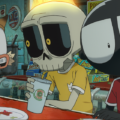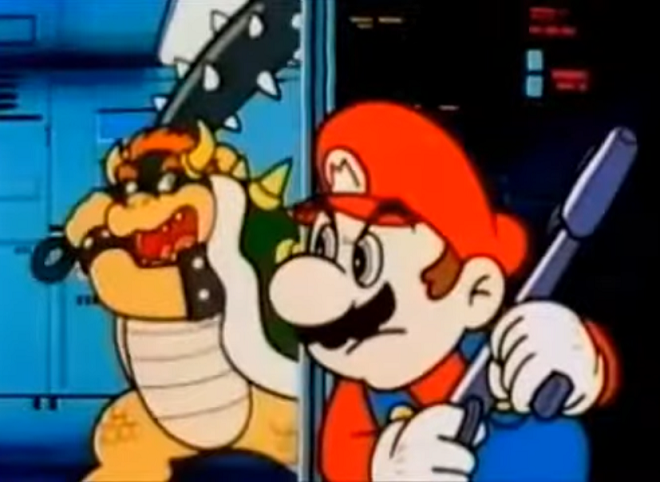Quarantine Control #157: Bad Hoppin’ Heroes

There hasn’t been much about COVID-19 in the news recently because way, way too much other news is dominating the headlines. The journalism and politics websites cannot be blamed when the top story involves a former president being (deservedly) indicted for the first time in the United States’ history, an important first step even if this doesn’t result in jail time. Not to mention there are other more serious investigations happening while Donald Trump revs up his 2024 campaign at far-too-early of a stage, the latest proof of how he can’t leave us the hell alone. The media, to be fair, can’t leave him alone either considering how they breathlessly covered his arraignment this week. We’re stuck in a kind of hell here.
Geoffrey Barnes
Star Wars: The Bad Batch — Season 2 (2023)
Source: Disney Plus
Episodes: 16
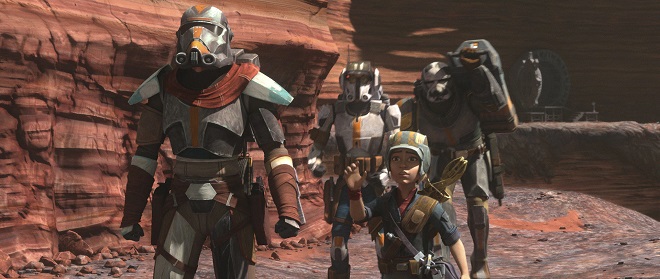
A key and succinct question drifted through my mind after reading that Lucasfilm confirmed a second season of The Bad Batch: Why? The first season was fine enough, nice to have in lieu of other animated Star Wars content outside of one-time-only Visions specials and a series of Tales of the Jedi shorts. But it was nothing spectacular, often leaned a bit too close to the Mandalorian when it came to an adult — adults in this show’s case — taking care of a young child as they venture across the galaxy, and lacked character development for the core crew outside a few episodes. After finishing the season, perhaps that was always a foolish question. Rough starts are synonymous with all animated Star Wars shows, and the chances of this show finding its footing in the second season were moderately high. This fortunately came to pass.
This season continues the exploits of Clone Force 99, including Hunter, Wrecker, Tech, and Echo, the “defective” clones of Jango Fett helpfully named after their chief skills. Omega, the young female clone, continues tagging along with them, growing up and becoming a better fighter, pilot, and engineer in the process. A good portion of the second season still involves the team doing jobs for Cid on several planets featured in prior Star Wars series and movies, with often-interesting references to them. But the quality within these specific episodes makes it clear that the writers and directors listened to criticism from the first season, and included a wider variety of stories and opportunities for character development. There’s also a larger purpose for the Bad Batch themselves, and further illumination of developments occurring within the universe shortly after Revenge of the Sith.
Former Clone Force 99 member Crosshair returns to help The Bad Batch at the first season’s conclusion, but doesn’t rejoin the group. He instead remains with other clones working for the Empire, with unsurprisingly mixed results. This was an important development for the overarching narrative, as the episodes focused on him shine a light on everything else happening in the universe during this point in time. The Empire is slowly spreading their influence across the universe (touched upon in the first season, but in greater focus here), and the Galactic Senate is diminishing in power alongside it. The story also starts tackling a certain other subplot involving the clones that had thus far remained a mystery outside supplemental media to the movies and TV shows.
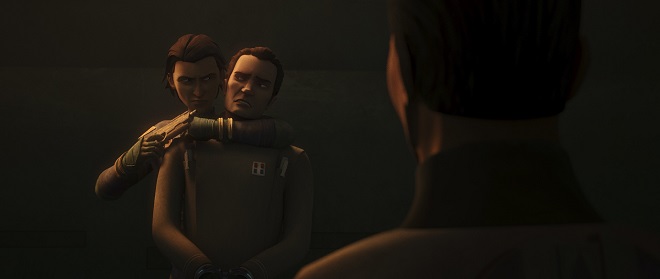
This season appreciably brings back the politically-infused stories from earlier seasons of Clone Wars, the amount of which were apparently lowered because they were considered “boring” for an animated show on Cartoon Network. But it’s been a while since Lucasfilm made an animated series beholden to what overseers deemed acceptable for a show aired on both that network and Disney XD, and The Bad Batch is all the better because of it. The new villains introduced are a considerable step up from the previous season’s, and all the main characters have solid purposes now. The politically-charged episodes invite comparisons to Rogue One: A Star Wars Story and prequel Andor, the latter being through pure coincidence given the timing, and that’s hardly a flaw.
The show is also a sight to behold. The first season looked good, but it felt like the team watch Arcane: A League of Legends Story and figured they could nearly rival that here through its beautiful animation and environments.
I was a little concerned when the best episodes in the first half didn’t directly involve the titular Bad Batch’s exploits, but this issue is alleviated as the overarching story starts bringing them in for the second half and the well-done conclusion. Episodes that don’t involve the main story feel present for nostalgic fanservice’s sake, but those are fine too. The season’s 16-episode length makes it easier for them to be included while not taking away from the larger narrative. But they’re much better when they include character development and bonding moments for the team, as they do in the second half. The writers and directors for the season knew that a stronger second half and finale are what matters most for a lasting impression.
There were stumbles in the first season, as Star Wars animation is wont to have, but the second season of The Bad Batch justifies the show’s existence. It similarly reemphasizes the mantra that the franchise has a better track record with animation compared to live-action under Disney, currently being displayed through this show’s higher quality compared to The Mandalorian’s aimless third season thus far. My hope is that the team received a certifiable green light for the third season of this show after the second season’s inconclusive nature, with Star Wars potentially being shielded from the current Disney cuts. If not, the remainder of the story could at least be resolved through a movie. It may not be as hard to get off the ground as a live-action Star Wars film.
Angela Moseley
The spring 2023 anime season is here and with it, comes a variety of new and returning shows. None of which I’ll be getting to any time soon because I’m behind again. On the upside, I am making progress on that backlog.
My Hero Academia, Season 6 (2022)
Source: Crunchyroll, Funimation, Hulu
Episodes: 25
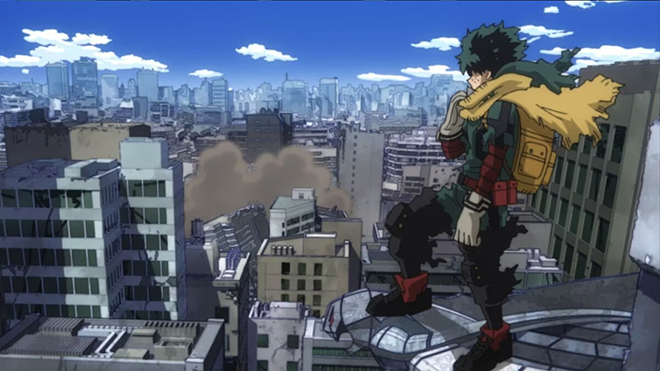
At six seasons in, My Hero Academia is feeling long in the tooth. To be fair, this series isn’t as bad as the big shonen shows from the 80s, 90s, and aughts that ran for hundreds of episodes, including filler episodes. It’s nice that My Hero Academia takes a break when it gets close to the manga. That said, sometimes the source material isn’t all that enjoyable. Season 5 was a letdown because it focused too heavily on unlikable characters. I dislike Tomura Shigaraki as a villain and the fifth season exclusively focused on how he and the League of Villains rose to the top of the evil pecking order in Japan. Thanks to help from All for One and his cronies, Shigaraki overthrew and came to rule the Meta Liberation Army– a rival faction that sought to overturn the government and various regulations on Quirks. In theory this should be interesting, but the execution was flawed. In comparison, season 4 was enjoyable.
Suffering through season 5 did reward patient viewers with payoff in season 6. This includes All for One’s real plans for Shigaraki’s body and mind, and Izuku Midoriya’s One for All Quirk. Having a long season with 25 episodes allowed the plot to have two distinct halves. The first half where the top members of the Meta Liberation Army (renamed the Paranormal Liberation Front) makes their moves and outplay the heroes to a degree, and the second half where society has collapsed as a result.
The heroes lead by Hawks and Endeavor plan to attack the Paranormal Liberation Front from two angles. Most of the pro heroes, including the students of Class 1-A go to the Liberation Front’s Gunga villa to launch a massive surprise attack on the villains there. The second, smaller group, lead by Endeavor go to the major hospital in Jaku City which is a secret front for creating Nomus and improving Shigaraki’s body. The hospital is led by Dr. Garaki who’s a long-time supporter of All for One. At first the heroes on both fronts seem to have the advantage until some of the best villains make their counter moves.
On the Gunga villa front Dabi overpowers Hawks, while Himiko Toga attacks various heroes. On the hospital front, Shigaraki is accidentally awakened from his enhanced slumber during fight between the heroes and numerous high-end Nomus. His decay Quirk has been greatly strengthened, and he uses it to destroy much of Jaku City. Additionally, his awakening activates his strongest underling, the overpowered and nearly unstoppable Gigantomachia, who plows through heroes and what’s left of Jaku City in order to stand at Shigaraki’s side. The class of 1-A combined with pro heroes do their best to slow down Gigantomachia, but he makes it to Shigaraki anyway.
Eventually, it’s revealed that Shigaraki is slowly being absorbed by All for One’s original holder, and he wants to absorb One for All as well. This is adverted thanks to the combined might of Midoriya, a few members of Class 1-A, and all the pro heroes that made it to the fight, including Best Jeanist, who’s the best hero. Gigantomachia is put out of commission, and Shigaraki is forced to retreat, but not before some of his underlings are captured or killed. The victory is Pyrrhic at best, because the country learns the villainous Dabi is actually Endeavor’s long-lost son (who was thought to be dead), and the collateral damage is catastrophic.
As a result public trust in the heroes begins to seriously wane. The worst isn’t over, as the remnants of the Paranormal Liberation Front launch a massive attack on the high security prison, Tartarus. There, numerous criminals are released and flood Japan in order to cause chaos and to take revenge for being jailed. All for One plans to use the confusion to find and subdue Midoriya in order to forcibly take his One for All, which is not just super-strength, but a variety of Quirks. Midoriya wants to find Shigaraki and All for One just as badly, and leaves UA and his friends behind in order to draw the super villain out.
Season 6 makes up for the shortcomings of season 5 with lots of action, big fights, and a noticeable shift in society. The status quo is gone, and it’s been fascinating to see how badly people react to heroes not being there to keep them safe. On one hand, the pro heroes left are doing their best to keep everyone safe, but their lack of numbers and the sheer amount of chaos makes this task seem impossible at times. On the other hand, it’s amazing to see how many heroes took the job because it offered fame and clout, and ran away as they felt they were in over their heads. The previous society had an air of artificiality which is now gone for sometimes the better, but mostly for the worst.
The season also hyped up Midoriya as taking the path of a vigilante, a Dark Deku, if you will. The reality was overhyped and short-lived. It would be more apt to call Midoriya a temporary lone-wolf with a severe case of tunnel vision. He didn’t suddenly become an anti-hero, and don’t let anyone tell you otherwise. The biggest plus is Midoriya figuring out his powers as he awakens to the consciousness of the previous holders of One for All, and they lend him his power. Again, his power takes the form of a variety of different Quirks, like a light mirror version of All for One. Whereas All Might seemingly just had super strength, Deku has that strength (though he can’t safely use it at full power), and other powers such energy whips, smoke generation, and a danger sense. (Some of his powers definitely feel inspired by Spider-Man.)
Shigaraki annoys me as a villain because of how he was supported for All for One, despite not being that remarkable of a villain. He was basically allowed to fail upward. It was not unlike watching mediocre tech bros succeed in the real world. Their talent is average at best, yet they keep having money and resources thrown at them. In the case of My Hero Academia, this power came with a cost. All for One plans to forcibly overtake Shigaraki, despite the boy’s protests. This revelation feels amazing because it is less of unearned resources and power, and more of a deal with a devil coming to collect consequences. In short, we have a person who’s gained everything he could ever want, but unless Midoriya intervenes somehow, Shigaraki will literally lose himself in the process.
Season 6 of My Hero Academia is a season that has put the pieces in place for the endgame. Japan has fallen on rough times and heroes from around the world are coming to aid the country. At the same time, one of the most powerful villains to have ever existed is on the brink of regaining his former glory and Midoriya doesn’t have time to really rest and figure out all of his powers. I’m actually looking forward to season 7. Better yet, I hope by the time it does air the manga will have been finished, and this show will wrap up neatly with an eighth season. If you’ve been reading my writing for a while, you know how I’m not a fan of shows overstaying their welcome, and My Hero Academia is pushing that line.
Joseph Daniels
The new Super Mario movie came out this week, and from what I’m hearing from fans, it’s actually pretty good. This is going to come as a relief to the fans who were anticipating but also likely dreading this movie a little bit. Illumination is known mostly for their mascot, the Minions, and the Despicable Me franchise as a whole, sort of like how Dreamworks is mainly the house that Shrek built. Illumination has also had a history of movies that have varied levels of quality. Just last week, I briefly talked about how The Secret Life of Pets wasn’t to my liking and seemed kind of terrible. Meanwhile, in the past, I raved about Sing 2 and in fact, pretty much as soon as Mario hit theatres this week, Sing 3 was announced, so I’m cautiously optimistic, but given the quality of the Sing franchise despite everything about them, I’m a bit more optimistic and less cautious than normal, especially if they don’t try to get Seth MacFarlane back, he was the best thing to not happen to the second movie. So honestly? Mario could’ve gone either way.
It didn’t help that Hollywood golden boy Chris Pratt got hired to play Mario and then was promptly hired to play other iconic and well known characters that already had established voice actors who did a good job with them, like Garfield (voiced originally by the incomparable Lorenzo Music, then voiced by Bill Murray in a couple films that looked terrible, but Murray did a pretty good job and is still alive and could possibly have kept voicing Garfield if he’d wanted to). The worst part of this is, no one waited to see how he would handle Mario before immediately handing him other roles that you wouldn’t think he should be qualified for. Sure, he’s great in Guardians of the Galaxy and I’m looking forward to the third movie, but I was very reluctant to accept him as Garfield until at the very least we heard him as Mario.
The good news is, the fanboys seem to like him, and fanboys are notoriously awful to people they perceive as doing a poor job with their franchise (look at what happened to poor Jake Lloyd after his very brief time in Star Wars). The bad news is, I live somewhere without ready and convenient access to a theatre (imagine driving four hours on a round trip to watch a movie), and I don’t feel like pirating it, so I’m going to wait for it to come to streaming. The biggest trouble with that is Illumination seems to shop their licenses around a lot, so I have no idea where to expect it, here in Canada. It could pop up on Netflix, it could pop up on Amazon Prime. It probably won’t pop up on Disney+ but I guess you never know, they’re currently running Bleach for some strange reason, so at this point, it feels like anything goes.
This Sunday being Easter, I wanted to briefly talk about what would’ve been the iconic Easter movie if it were any good. One of Illumination’s early experiments was to blend animation and live action like had been seen with movies like Alvin & the Chipmunks, and it should be pretty telling that they never did it again.
Hop (2011)
Source: Crave (Canada), Peacock (United States)
Rabbits?: Several main and supporting characters
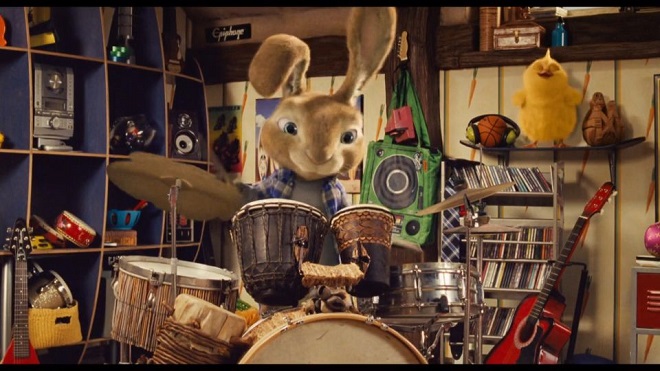
See what I mean about Illumination shopping their movies around? The Mario movie is apparently going to go to Peacock as well, but here in Canada, Peacock is unavailable, so if they want an international audience to watch it, they’re going to have to make a deal with someone.
Hop is the story of a rabbit who is to be the successor to the Easter Bunny and who is appropriately named E.B. by his father. But being the Easter Bunny seems like too much responsibility for him, he’d much rather be a drummer and join a band. So one day he runs away from home.
Meanwhile, in the human world, a young man named Fred, presented here as an unambitious and lazy slacker, witnessed the Easter Bunny delivering chocolate during his childhood. He’d only seen it once and only for a moment, but since then, he’s been searching for the same magic. So when he accidentally hits E.B. with his car, he does what you’d expect him to do.
No, just kidding, he runs away screaming when E.B. starts to speak. Which… why is that always the reaction whenever an animal says something? Like, wouldn’t you be the least bit curious as to why this is happening, and in the meantime, maybe try not to let that potential magic get away? No? Just me? I mean, you never know. Your talking squirrel might eventually be convinced to stop setting you on fire, especially when she finds she likes video games a bunch.
In the live action Alvin & the Chipmunks movie, Dave’s reaction is largely the same, until he finds out that Alvin and his brothers can sing. Talking chipmunks are evil and weird. Singing chipmunks? Cha-ching!
E.B. guilt trips Fred into staying with him, whereupon he starts to turn Fred’s life upside down. He destroys the mansion Fred’s pretending to housesit, he ruins a job offer that Fred received, then he happens to run into the Blind Boys of Alabama randomly at a video game company because they’re recording music for a video game (you’d think the company would’ve just licensed some music since they make a bunch of Band Hero rip-offs, but I guess the Blind Boys of Alabama were willing to record some music for cheap?), then he finds out that Hollywood actor David Hasselhoff, of Baywatch and the more successful version of Knight Rider, is holding auditions for a talent competition in the vein of America’s Got Talent (which he actually did work as a judge for at one point, so it’s not as out there a casting choice as it seems). However, in his efforts to remain in Hollywood and evade an elite group of rabbits known as the Pink Berets (because they wear pink berets and I’m assuming they’re all rabbit does, unless one is a buck and I never knew), he tries to throw them off his trail by dressing a frozen turkey in one of his shirts and setting it on the stove to cook. This gets Fred in trouble with the rabbits on Easter Island and my thought is, why doesn’t he just leave a suicide note? He has to know that Fred will get blamed for cooking him and at least this way, he and Fred can live in peace for a few months until word gets back to his father that he’s still alive. Because word will get back to him regardless. Did he think he would become a famous rabbit drummer and no one would tell his dad? If you’re going to fake your death, at least do it in such a way that your friend doesn’t get in trouble.
In the end, he skips out on the audition after getting some advice from Hasselhoff and goes to rescue Fred. This has the added effect of also letting him save the day with his drumming when one of the workers at the candy factory tries to stage a coup, and since he’d been training Fred to be an Easter Bunny, he convinces his father to let Fred help every year. This is right up Fred’s alley, so he accepts the job. The ending, where he tells his family, has heavy The Santa Clause vibes.
This also reminds me. Fred runs screaming when he meets E.B. Literally everyone else in the movie seems to accept talking rabbits as nothing inconsequential. Most notably, Hasselhoff makes a Knight Rider reference to explain why he has no problem with it. This is very similar to how everyone in the world accepts Alvin & the Chipmunks and Dave is the only one who freaks out. They establish that this sort of thing is out of the ordinary, but then realize partway through that for the premise to work, everyone has to accept it and so we get to skip over like, fifty other freak-out scenes.
Anyway, that’s Hop, pretty much the big Easter movie that isn’t part of a franchise. I think the only other film that really qualifies would be The Dog Who Saved Easter, which sounds like it borrows heavily from Home Alone while making a stop at the live action 101 Dalmatians movies along the way, but I can’t bring myself to watch it. Maybe someday, someone will make a better Easter movie, but I’m not really holding my breath.
This Week’s Short Film
Happy Easter (2020; YouTube upload 2021)
And a Bonus Video (Because I Think It’s Cute)
The Braid Debate (2022)
There was a little mistake in the ledes and conclusions of posts from previous weeks. It’s actually next week’s post that will be closer to Quarantine Control’s third anniversary on April 10th, the time when it became apparent that the COVID-19 pandemic would absolutely not be over by mid-spring. The problem involved how a certain writer here is hilariously bad at math. Apologies. Until next week, though no promises that everyone involved with these posts will have anything commemorating the occasion outside an acknowledgement.

